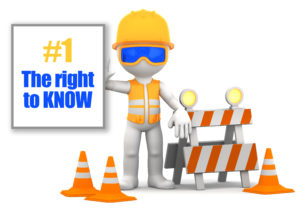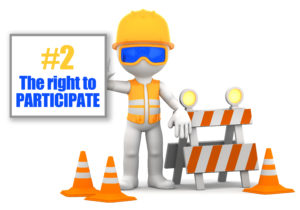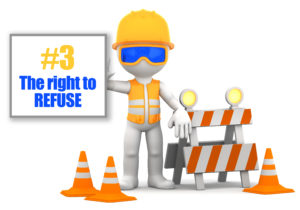
As an employee in Canada, you have a minimum of three basic rights when it comes to Occupational Health and Safety.
These rights were born in Saskatchewan and later adopted by all provinces and the country. While Canadian occupational health and safety legislation guarantees these rights for all employees in Canada as a minimum, each province has the authority and ability to adapt and strengthen these rights in their jurisdictions. The Saskatchewan Employment Act and Regulations also guarantee these rights for all workers in Saskatchewan.

You can’t safely guard against a hazard if you don’t know it exists
#1. The right to know about health and safety. [WorkSafe Sask video]
As an employee you have a right to know hazards that are present in the workplace or are likely to be in the workplace. It is the responsibility of the employer to inform you and to provide information, instructions, education, training and supervision as needed to protect your health and safety. All these things must be provided before the work begins.
While it is the responsibility of the employer to inform you, you also have a responsibility to ensure you are engaged, educated and participating by asking questions and seeking clarification before you start the work.
If you haven’t been informed of the hazards, STOP!
Don’t start a project without knowledge about the hazards in your workspace or the workspace you may be going into.
For instance, if you are asked to travel to a different work location to do the tasks you perform at your home location, you must be aware of the differences between the two locations. Even if it is a similar task, the way you complete a task at your home station may not be the same protocol for the location you are traveling to. The environment, the people you are working with and the tasks they are responsible for performing are all new to you. You need to be instructed on how to complete the task and who is responsible for other tasks.
Example: Loading Rail Cars
While you may open and close rail cars at your home station during the loading process, the way you access the top of the rail cars may be different than other locations. Likewise, safety procedures for moving cars and the emergency procedure to get off the top of the rail car may be different, the people responsible for completing tasks may be unfamiliar to you and the tasks of their position may be different than those at your home station. It’s also important to be aware of language or cultural barriers in the new location that are not present in your home location and to note who on staff has first aid training.
These are only a few examples of differences you may encounter doing a similar task in a new environment.

As an employee, you have the right to participate in planning to minimize or eliminate hazards in the workplace.
#2. The right to participate in decisions that could affect your health and safety. [WorkSafe Sask video]
One way to participate is by becoming a member of your workplace OH&S committee. Saskatchewan legislation requires workplaces with 10 or more employees to have an OH&S committee. The committee must be equally comprised of employer and employee representatives. Larger federal employers have additional responsibilities and committees to ensure the safety of their workers.
In the work place you can participate in OH&S by bringing forward ideas, risks, and concerns to the attention of your supervisor and OH&S committee. When asked to do a task, you have the right to participate in planning and control of the risks and hazards that are present, and you can make suggestions to your supervisor and OH&S committee.
Don’t hesitate to contact your GSU staff rep if you need assistance with an issue in your workplace.

#3. The right to refuse work that could affect your health and safety or that of others. [WorkSafe Sask video]
Employees have the right to refuse and the right to know if work has been refused.
Don’t be afraid to exercise this right when you believe the work will endanger the health and safety of self or others. Exercising this right is a serious decision that should not be taken lightly and it shouldn’t be used as a routine method of solving workplace problems.
It’s not only the work that may be dangerous. There may be situations or people who may make the work dangerous. For example, if you are required to work at a height with another worker who is afraid of heights, their fear could endanger them or cause a situation that presents danger to you. As well, if you are required to perform a task with a member of your team who is not fit for work, you have a right to refuse to work with them.
If you choose to exercise the right to refuse, you will need to do the following:
- Tell your supervisor what is unsafe about the work. Your supervisor must take corrective action if they agree with your concern, or explain why they disagree.
- If you are not satisfied with your supervisor’s actions/explanations and your workplace has a health and safety committee or representative, advise them of the situation. The committee can conduct an investigation on your behalf and provide a decision on their findings. If they agree with you, they can make recommendations to the employer to correct the situation.
- If you are unsatisfied with the committee recommendations or there is no committee or representative in your workplace, contact your local health and safety officer in your province. If the officer disagrees with you, they can instruct you to return to work. If you disagree with the officer’s decision, you have a right to appeal the decision with your jurisdiction.
The employer has the right to temporarily reassign you to perform other work while the investigation is being conducted and to reassign another worker to perform the work but they must inform them that the work was previously refused.
If you have questions or need assistance with your right to refuse or other issues in your workplace, don’t hesitate contact your GSU staff representative.
If you have questions about your OH&S rights at work, don’t hesitate to contact your GSU staff rep. Their services are provided to you and paid for by your union dues. There is no limit on the times you can seek assistance and there is never an additional charge to you. All inquiries are strictly confidential.
